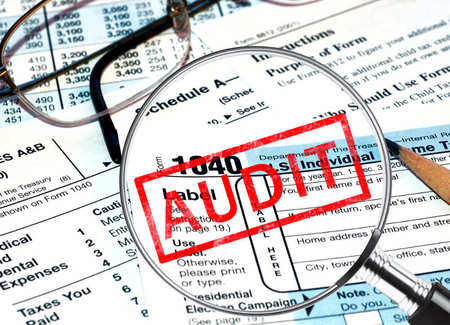
No one wants to be audited by the IRS. Sometimes IRS audits are warranted and other times they simply happen to people who really didn’t deserve it. However, there are ways to minimize your risk of an IRS audit. Here are nine to keep in mind as you organize your finances and work with your CPA.
1. File Accurate Returns
One of the most common red flags that come up is returns with mistakes. Granted, it’s complicated to fill out tax forms, which is why most people use a CPA. In any case, making sure that your tax return is filled out completely and accurately will help to minimize your chances of being audited by the IRS.
2. Keep Detailed Records
Hopefully, you’ll be giving all your final numbers to your CPA for filing, and not try to go it alone. But all those numbers need to be backed up by detailed records. By maintaining records of all income, deduction claims, credits and expenses, you can ensure that you have proof that they’re valid if the accuracy of your return is ever questioned by the government. Sometimes the IRS will ask for some verification if something is questionable on your return. If you have the backup readily available, that’s often the end of it. Otherwise, the next step might be an audit.
3. Report All Income
Make sure to report all sources of income, including wages, self-employment income, interest, dividends, and any other income received during the tax year. If you fail to report certain income, you could leave yourself open for an IRS audit. This is especially the case if someone who paid you files their return and reports your income. So if the numbers don’t add up, your return will be flagged. Now, there will be an opportunity for you and your CPA to file an amended return, but it’s definitely not helpful to be singled out like that, especially for failing to report certain income.
4. Stay Current With Tax Laws
Tax laws seem to be ever-evolving, and it’s almost like the IRS purposely makes things confusing. Still, taxpayers are supposed to stay up-to-date with tax laws to ensure compliance. For most folks with families and lives to live, it’s too much to try to decipher changing tax laws every year. That’s why it makes smart sense to hire a CPA to handle your taxes for you. Your CPA is always up-to-date on tax laws, so you don’t have to worry about it personally.
5. Avoid High Risk Activities
Minimize activities that are commonly associated with higher audit rates, such as excessive business expenses and large charitable contributions relative to income. Like it or not, certain business activities can raise red flags too, such as doing business with entities in certain countries, taking deductions for activities related to certain foreign countries and more. Finally, dealings in unusual assets like NFTs and crypto may raise eyebrows, even though technically they’re legal. If you are involved in activities that tease the line of what’s legal, make sure you are completely above board and keep all of your records very organized.
6. Report Foreign Assets
Speaking of foreign countries, if you do have foreign financial accounts or assets, comply with the reporting requirements of the Foreign Account Tax Compliance Act (FATCA) and the Report of Foreign Bank and Financial Accounts (FBAR). If all this sounds new or complicated, you’re not alone. Your CPA can supply all the details you need and make sure that your tax returns are compliant.
7. Respond Promptly to IRS Correspondence
If you receive any communication at all from the IRS, respond promptly and provide any requested information or documentation. You never want to set the letter aside or put it out of sight, because you might forget about it. Deal with it as soon as you get it. If you’re unsure of what the letter means or what it implies, just forward a copy of it to your CPA, then follow up to discuss next steps. In fact, your CPA should be CC’d on all IRS correspondence, no matter how simple it may appear on the surface. Ignoring IRS correspondence can escalate the situation and greatly increase the likelihood of an audit.
8. File on Time
Many people believe that if they wait and file with an extension, they will reduce their chances of being audited. Their reasoning is that the IRS will audit only a certain number of returns, chosen from a pool of returns submitted by the first deadline. However, there’s no proof that this is true. Whether you file your personal return by April 15th or by the extension deadline of October 15th, your odds of being audited probably have very little to do with it. Just make sure that you file on time in April, or on time in October if you need the extension. Missing deadlines will certainly make your return stand out from others that were submitted on time, and that will almost certainly increase your chances of an IRS audit.
9. Be Transparent
If you do get questioned by the IRS, be totally honest and transparent. Disclose any errors or discrepancies on your tax return and work with your CPA to resolve them promptly.
If you take these steps, then your chances of being audited by the IRS may be reduced, but there are no promises. Working with a CPA will greatly help ensure that you’re filing accurate returns on time and only taking legal deductions. Get in touch with your CPA to learn more.
by Kate Supino
